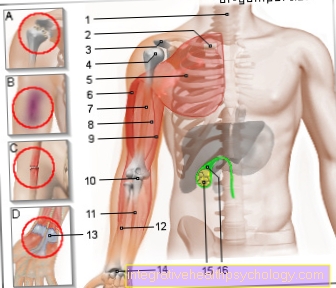Abscess on the neck
General
An abscess on the neck forms due to an inflammatory process.
It represents an encapsulated cave which is filled with pus. It is also important for the definition of an abscess that it forms a cavity that did not exist before. The pus it contains consists of dead cell material, bacteria and the body's own inflammatory cells.
The abscess cavity is usually not connected to a blood vessel, which makes therapy difficult. In some cases, so-called “sterile” abscesses can occur in which no pathogen can be detected.
An abscess on the neck can be life-threatening, depending on its size and location, which is why a doctor should be consulted immediately if there is an inflammatory swelling in the neck region.
Causes of an abscess on the neck

The causes for the development of an abscess on the neck are very diverse.
Depending on the localization, a theory can often be set up as to what the causative trigger of the abscess was. In most cases, bacteria such as staphylococci or streptococci can be detected as triggers in the pus of the abscess. But other pathogens such as the mycobacterium tuberculosis can also cause abscesses in the neck region in the form of organ tuberculosis.
In the past, due to the lack of antibiotic use, there was often an abscess of the mastoid process behind the ear due to an inappropriately treated and therefore not healed otitis media, especially in children. By using antibiotics for otitis media, the occurrence of these abscesses on the ear could be greatly minimized.
A frequent cause of the development of an abscess on the throat are also infections, which primarily occur in the mouth and throat area. Infections of the teeth and roots of the teeth, the base of the tongue, throat or tonsils can form abscesses on the neck.
Such an abscess can sometimes be difficult to recognize from the outside, as these are often located in deeper layers. Since vital structures also run in the deeper layers of the neck, it is important in these cases to consult a treating doctor quickly who will arrange individual therapy.
Ultimately, injuries and inflammation on the skin surface can also lead to abscesses in the neck region. Such an inflammation can occur particularly when the whiskers on the neck are shaved, for example due to contaminated razor blades
Symptoms of a neck abscess
General symptoms that occur with most abscesses due to the inflammation are reddening and overheating of the affected area around the swelling that has occurred.
In most cases, the area of the abscess is very painful. It may also show pus when the cavity opens spontaneously.
The pus has a yellowish color and a liquid consistency. General signs of inflammation such as a feeling of being sick, fever and chills are also common.
In addition to the general symptoms, depending on the size and location of the abscess, specific symptoms can also occur. For example, an abscess can pinch the windpipe and cause shortness of breath. Such a complication is an emergency that requires immediate therapy. The vessels in the neck can also be pressed off by the abscess. The pain can cause difficulty and severe pain when eating and speaking. The pain that occurs in the advanced stage of an abscess is usually perceived as strong and throbbing.
diagnosis
At a Abscess on the neck a doctor should be consulted in any case, as healing without medical help occurs only in rare cases.
Diagnosing one Abscess can be done in an advanced stage solely by taking a medical history and physical examination of the person concerned. The typical symptoms of an abscess range, along with that Palpable findings, mostly from making a diagnosis.
However, it may be necessary imaging diagnostic methods to be able to determine the extent of the abscess.
So can a Ultrasound examination, but also an investigation with one MRI or devices with the use of X-rays function, provide information about how large the abscess cavity is and what structures it is adjacent to.
An examination of the blood can confirm the presence of an inflammation, but usually does not provide any information about which pathogen is causing the abscess. In order to determine the pathogen, the pus which is located in the abscess cavity must be examined. Once the pathogen has been detected, specific antibiotic therapy can be carried out if necessary.
Therapy for an abscess on the neck
Treatment of an abscess depends on the size and location of the inflammation.
In the case of superficial abscesses in the early stages, a cure can usually be achieved through systemic administration of antibiotics. In many cases, antibacterial therapy with antibiotics is not enough to adequately treat an abscess on the neck.
This is due to the lack of connection between the abscess cavity and blood vessels, which is why even systemic antibiotics cannot prevent the bacteria from multiplying. The use of local antibiotics should be avoided altogether, as these have no chance of sufficiently containing the inflammation. Squeezing out the abscess should also be avoided because there is a risk of it opening inwards and thus blood poisoning (sepsis) consists.
For this reason, abscesses on the neck are often surgically opened. Here, the pus is flushed out of the abscess cavity, usually under general anesthesia, and a so-called drain is placed in the cavity. In this way, the cavity can also be rinsed after the operation until it has completely healed. On the neck, great care must be taken to ensure that surrounding structures are spared during a surgical opening. The anatomical tightness of the neck of many important structures makes it difficult to operate on an abscess in the neck area.
Read more on this topic at: Abscess treatment
You might also be interested in this topic: Betaisodona spray
forecast
The forecast at Abscesses is very good overall if the inflammation is adequately treated.
Above all, it is important that the therapy is given as early as possible. This is especially important in the case of abscesses in the neck area, as many vital structures run on the neck which must not be pressed. Especially when fever and chills it is important to consult a doctor quickly.
The danger of a Blood poisoning (sepsis) is present in all abscesses and greatly worsens the prognosis.
If the use of Antibiotics If it is not promising, a surgical opening of the abscess should be considered as soon as possible, as this is the alternative therapy option in many cases.





















.jpg)







